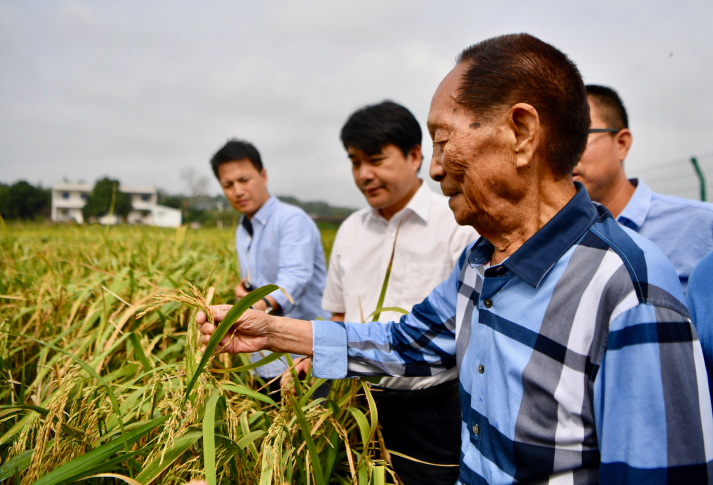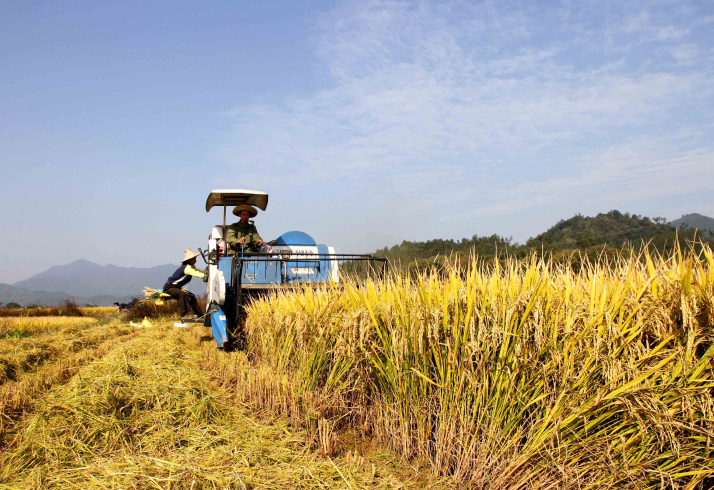|
||||||||||
| Home Nation World Business Opinion Lifestyle ChinAfrica Multimedia Columnists Documents Special Reports |
|
||||||||||
| Home Nation World Business Opinion Lifestyle ChinAfrica Multimedia Columnists Documents Special Reports |
| ChinAfrica |
| China's production, reserves enough to ensure food security despite impact of the coronavirus |
| The Chinese Government said the country has ample grain reserves to ensure stable supply |
| By Xia Yuanyuan | VOL.12 May ·2020-05-20 |

Recently, 27-year-old Beijing resident Su Ying and her parents had a disagreement on whether to snap up sacks of rice and flour for hoarding.
"Upon hearing that some countries are restricting rice exports due to the spread of the novel coronavirus disease (COVID-19), they wanted to store more food than usual in case of price spikes," Su told ChinAfrica. "I told them that China has sufficient supply of food, but they are still worried."
Indeed, with a growing number of people around the world under stay-at-home orders to slow the spread of COVID-19, there are concerns the epidemic may trigger a food crisis. On March 31, the heads of the UN Food and Agriculture Organization (FAO), the World Health Organization (WHO) and the World Trade Organization (WTO) urged countries to minimize the impact of COVID-19 on the global food supply chain.
"As countries move to enact measures aiming to halt the accelerating COVID-19 pandemic, care must be taken to minimize potential impacts on the food supply or unintended consequences on global trade and food security," FAO Director General Qu Dongyu, WHO Director General Tedros Adhanom Ghebreyesus and WTO Director General Roberto Azevedo said in a joint statement. The statement also warned that uncertainty about food availability can spark a wave of export restrictions, creating a shortage in the global market, and such reactions can alter the balance between food supply and demand, resulting in price spikes and increased price volatility.
In response, the Chinese Government said the country has ample grain reserves to ensure stable supply. "Despite the impact of the epidemic, there is no need to hoard groceries," said Wei Baigang, an official with the Ministry of Agriculture and Rural Affairs.
No need to fear
"China is a large agricultural country with a range of policies to support agriculture and farmers. I have confidence in our food security," Tan Xiao, a 45-year-old farmer in Hebei Province, told ChinAfrica.
Agricultural expert Yuan Longping, known as the "father of hybrid rice" for developing the world's first hybrid rice strains, also advised people against going into a panic-buying mode.
"China is completely self-sufficient in food production and will not face a food shortage. There is no need for people to be worried," Yuan told Xinhua News Agency on April 5.
According to Wei, China's rice production is abundant and its reserves are adequate. He added that the country has taken comprehensive measures to stabilize rice prices, and that there is no need to hoard supplies.
Wei's statement is well-founded. China has recorded a long streak of bumper harvests. Since 2012, its grain output has exceeded 600 billion kg for seven consecutive years, according to the Ministry of Agriculture and Rural Affairs.
"The grain reserves per capita are 470 kg, higher than the world average," Wei said at a press conference in Beijing on April 4. "Stocks of wheat and rice are sufficient to meet domestic consumer demand for one year."
The government's response has relieved much of the panic and worries about food shortage among consumers, including Su's parents.
"Now, they understand it is not a wise choice to stockpile food as the government has reassured sufficient supply," Su said. "It is better to eat food prepared with fresh ingredients."

Self-sufficiency
There is another reason not to worry about food shortage in China as the country has realized self-sufficiency in grain supply.
According to Wei, the annual grain imports make up roughly 2 percent of China's consumption. Though some countries have imposed bans or other restrictions on grain exports, it will not influence China's food security. The country's stocks of three major staple foods - wheat, corn and rice - are big enough to meet domestic demand despite a drop in imports.
On October 15, 2019, the State Council Information Office issued a white paper titled "Food Security in China." It pointed out that in recent years, China has achieved self-reliance in securing its own food supply; its people now not only have enough to eat, but also a greater range of choices.
In 2018, China's cereal production was 610 billion kg, accounting for more than 90 percent of the total food output and growing by 160 billion kg over 1996. Currently, China supplies 98 percent of its own needs for grain, laying a solid foundation for maintaining national food security.
Though China imports grain from overseas, the main reason is to satisfy the need for variety. Therefore, international price fluctuations will not pose a risk to China's food prices.
Science and technology
As food is closely linked to economic development and people's wellbeing, China has always prioritized food security in national governance. It has implemented a number of policies and measures to increase grain production, with a focus on strengthening scientific and technological support.
In 2018, the contribution of scientific and technological progress to agriculture reached 58.3 percent, an increase of 42.8 percentage points from 15.5 percent in 1996, according to the white paper.
For example, developed by Yuan's team, the super hybrid rice has generated the yield of nearly 18,100 kg per hectare, setting a new record worldwide. Highly efficient technology is applied in the cultivation of dwarf male-sterile wheat, hybrid corn and other high-quality crop varieties.
In addition, scientific fertilization, water-saving irrigation and green prevention and control have been popularized in a large part of the country. China has also overcome a series of key technological problems in grain storage and preservation, improving pest and mildew control, reducing loss, and ensuring freshness and quality.
"The popularization and application of advanced research outcomes have played a positive role in increasing grain output and ensuring food safety," said Zhang Hongyu, Vice President of the China Institute for Rural Studies at Tsinghua University.
Regarding the outbreak of the novel coronavirus epidemic, China has unveiled a series of measures to stabilize grain production, including setting region-specific grain plantation targets, offering subsidies to farmers and raising minimum prices for state procurement of rice, which would ensure stable grain production for the whole year, according to Pan Wenbo, an official with the Ministry of Agriculture and Rural Affairs.
(Print Edition Title: Safeguarding Food Supply)
* Comments to xyy@chinafrica.cn
| About Us | Contact Us | Advertise with Us | Subscribe |
| Copyright Beijing Review All rights reserved 京ICP备08005356号-5 京公网安备110102005860号 |